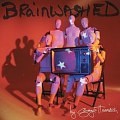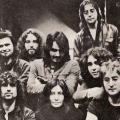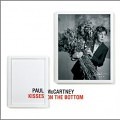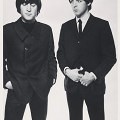- Hey Dullblog Online Housekeeping Note - May 6, 2022
- Beatles in the 1970s: Melting and Crying - April 13, 2022
- The Beatles, “Let It Be,” and “Get Back”: “Trying to Deceive”? - October 22, 2021
NANCY CARR • The “New” album is the occasion for Ben Greenman of The New Yorker to opine about Paul McCartney’s “generic genius.” That’s very much “generic” as in “bland and undistinguished,” not as in “genre-spanning.” Greenman asserts that the album’s title is “almost comically inaccurate,” but appears unaware that his own critique recycles cliches about McCartney that are drastic oversimplifications when they’re not flat-out false.
Now, I haven’t heard the whole album yet, so I’m not going to speak to Greenman’s assessment of it. What I want to discuss are his sweeping statements about McCartney’s music and career. Here’s the most telling paragraph:
“McCartney has been famous at an unimaginable level longer for than nearly anyone else alive. But as he has headed into old age, he has addressed the matter with a kind of relentless professionalism that borders on impersonality. He isn’t Paul Simon, using rueful humor to get a foothold on mortality. He isn’t Bob Dylan, grizzling his way to the grave. He isn’t Neil Young, hurtling from primal enthusiasm to primal enthusiasm, or Leonard Cohen, wisely dissipating into a mist of erotic Buddhism. He’s Paul McCartney, and he’s Paul McCartney now the way that he was Paul McCartney ten years ago, or thirty, generically exhorting listeners to action or reminding them of glory of love or sketching the outlines of a less pleasant emotion (fear, sadness, unregulated anger) without any real specifics. On album after album, McCartney has been content to be a rock star seen from the outside rather than an artist seen from the inside.”
Foolish statements, spurious distinctions
These are the kind of lazy generalizations about McCartney’s music that make me crazy. The last three albums of original material McCartney has released—Chaos and Creation in the Backyard (2005), Memory Almost Full (2007), and Electric Arguments (2008, with Youth, as “The Fireman”) have grappled with darker feelings in ways that are utterly unacknowledged by Greenman. To pick one stellar example, “You Tell Me” is a bleak look at past betrayal that’s one of the grimmest songs McCartney’s ever written and one of the finest of his solo career.
Criticism like Greenman’s shores up the hackneyed (and misguided) view that McCartney should be dismissed as a shallow entertainer, in contrast to the daring artists who bare their souls musically. The only song Greenman really likes on New is “Early Days,” because it is “the rare McCartney song that feels as though it was created honestly, by a real human, rather than strategically, by a corporate director interested primarily in promoting (or at least preserving) his brand.” McCartney, in this rendering, is only a “showman” who writes songs “that are without meaning but not meaningless.”
At this point it’s well to pause and note that this negative view of McCartney’s work on New is far from universal. Allmusic.com gives it four and a half stars, and Rolling Stone gives it four. So why am I bothering to respond to Greenman?
Looking closer, thinking harder
Two reasons. First, I think it’s important to point out how durable—how, in fact, impervious—McCartney’s reputation as a lightweight is in some quarters, despite evidence to the contrary. McCartney does bear a great deal of responsibility for that reputation, having put out music that IS soppy and boring, especially during the 1980s. But it’s irresponsible to ignore the fact that he’s also made excellent solo music that engages deeper emotions, and that starting in the 1990s he’s dug himself out of the pit he shoveled with stuff like Pipes of Peace and Press to Play.
Secondly, I’m increasingly convinced that the whole “savvy showman vs. unsullied artist” dichotomy is dangerously naive. McCartney transparently cares about audience reaction, and obviously loves performing, but that doesn’t make him nothing but a shill. Even more to the point, a musician’s reputation for “ragged candor” (the quality Greenman misses in McCartney) can also be a “brand,” and a very marketable one. It’s as foolish to believe that musicians who write pessimistic, ostensibly self-revealing songs are necessarily sincere as it is to believe that optimism and a degree of reserve are inevitable markers of falsity.
McCartney has plenty of faults, musical and otherwise, but I more and more appreciate his indomitable energy and musical fertility. And if you go by the dictionary definition of “genius,” which is “a person with exceptional intellectual or creative power,” then he is that, full stop.














Thank you, Nancy. I held onto this anti-McCartney orthodoxy for many years myself, not because I was responding honestly to what is uniquely good or bad in Paul’s work but because I felt I was preserving an aesthetic principle which kept me pure to myself, regardless of how inapplicable and unfair it might have been to the artist in question. In other words, critics are asses when they do nothing but replicate a bunch of hand-me-down standards that have not evolved significantly since 1971, rather than grow up, become individuals with their own ears and brains, and take each work as it comes, recognizing that pop is and should be a vast panoply of approaches and possibilities. Greenman is being an ass here because he expects McCartney’s “insides” to look like the insides of other artists he’s familiar with and rates more highly. No. His insides, like any superior artist’s, will, precisely because they belong to a superior artist, NOT resemble another’s. They will not give that comfort of familiarity (except perhaps with the artist’s previous works, unsurprising since those will have come from the same insides). Pop critics are comfortable tangling with the discomforts raised by a Lennon, a Dylan, a Young, a Simon (Christ almighty), a Costello, more recently a Kanye West, because they engage more or less directly with difficulties, neuroses, or at least imagery familiar from literature and film; that is, they’re lyrically coherent, and the music is approved to the degree it supports that coherence/familiarity. But I don’t know of a critic who has dealt with the particular discomfort aroused (in them, at least) by Paul’s anti-confessional approach. Maybe Paul exemplifies some Wildean paradox of personality, wherein the surface IS the substance, the mask is the man. Maybe his psycho-musical paradigm is totally innovative in post-Beatles pop-rock terms, and has been for all these years. Maybe he’s–get this, critics–DIFFERENT!
This is very, very well phrased–
“preserving an aesthetic principle which kept me pure to myself, regardless of how inapplicable and unfair it might have been to the artist in question”
Full disclosure: Ed and I went to school with Ben, and I consider him a friend (I assume Ed does, too).
Full disclosure #2: I wrote a comment yesterday that got eated. This one is MUCH crappier, but here goes:
Paul McCartney isn’t the same species as Paul Simon. He’s the last of the old-time movie stars—people like Cary Grant and Bette Davis and Marilyn Monroe, icons beyond publicity whose mortal form is wrapped in an impenetrable legend. And we won’t see the like of Paul again: more money gets made by building up, then tearing down, new people every six months. That was the Warholian lesson of the 60s, and because Paul has escaped that, he’s forever destined to be unhip. Hip is of the now; Paul is “timeless,” like Gershwin is timeless, or Bogart, or Woody Allen before Soon-Yi gave the press a chance to cut him down to size. (Woody’s never recovered, as an artist or a person.)
Paul McCartney is bigger than the media, and (unlike Lennon) feels no emotional craving to give them the soap opera they thrive upon. They can do nothing for him, really, and he knows it, and gives them only what he wants to give. The press resents him for this autonomy, and projects its own boredom on the man and his work, and turns on him savagely (LSD in ’67, breakup in ’70-72, pot bust in ’80, “it’s a drag” in ’81, and so forth) whenever possible. Paul’s not bigger than Jesus, but he’s certainly bigger than The New York Times, Murdoch, or any other outlet you care to name. The media can forgive any sin except one: not needing them.
And this autonomy, this self-sustaining fame, is precisely how Paul has been able to stay productive for so long. The simple placidity of his life is remarkable, because you can’t be Paul McCartney without having lots of the same troubles and temptations faced by your peers. And yet he’s still here, not through luck, or bland inoffensiveness, but a kind of cunning. Ben touches on this, but Paul’s cunning isn’t the cunning of the CEO, which is based on marketing and/or monopoly. Paul’s image hasn’t changed since 1963; there is no scarcity of music. Nobody’s forcing people to buy Paul’s songs or go to his concerts, and even though it’s always insinuated that he is a nostalgia act, the guy keeps experimenting.
What’s afoot is much more interesting than, say, Elvis in 1974, pushing his sweaty bloat through karate moves for an audience of kvelling tourists who were seeing…God knows what. With Paul there’s some charm and some bluntness; some truth and some fantasy; some nobility and some seduction; talent, self-knowledge (and even gentle mockery), a sense of history, sadness, optimism…What’s been going on between Paul and the world since 1963 is a very complex thing, and anybody who says otherwise is simply afraid to untie the knot.
Part of Paul’s cunning is producing work that does not provide a juicy enough text for critics to investigate and build upon. In sports, he’d be called “a bad quote.” Critics gravitate towards artists that give them good material, and try to encourage—through support, pop psych, or willful misunderstanding—the kind of exaggerated behavior that they need. Lennonesque soul-baring is an upmarket version of Miley Cyrus’ desperate twerk-and-grimace. Instead of “look at me, I’ll show you my fanny” it’s “look at me, I’ll show you my soul.”
Implicit in this relationship with pop music is the idea that four tuneful minutes can actually express the “ragged candor” Ben refers to. After many years of Lennonology, I am very dubious of this idea. Now that time has passed and the details have been sifted, much of the time rock’s seemingly straightest shooter turned out to be selling a fantasy, or at least a simplification of himself so radical that it revealed little if anything. Can the lyrics of a pop song—or even an entire album—really tell us very much about an artist? And if not, might not artists like McCartney be showing a kind of integrity and authenticity by not indulging this faux intimacy?
But YMMV, especially in criticism. My only issue with Ben’s review is that I didn’t hear much passion for McCartney in it; while it’s clear Ben knows a ton about music, I didn’t feel that he had much interest in Paul McCartney, either as a person or as a musician. After so much material, so many years in the public eye, and—as Nancy points out—such a strong tradition of critical disdain, anybody who isn’t fascinated by McCartney isn’t likely to find anything new to say. Ben seemed bored with the idea of Paul McCartney, which made him the wrong guy for that review, IMHO. But Paul remains fascinating, and undiscovered—he’s the cheery chappie whose greatest song is about loss and impermanence and regret; the pretty face that’s lasted 50 years.
Thanks, Devin and Mike. I appreciate you (and whoever else out there in the mirror universe is
reading this) bearing with my rant. I recognize that I’m venting in part because I spent a long time in thrall to the anti-McCartney orthodoxy of Philip Norman, Robert Christgau, et. al., only to discover belatedly that I’m a stone McCartneyite. This doesn’t feel like a choice: I line up with a lot of his stuff the way old-school printer cables, with all their pins, match up with particular computers.
One of the things that aggravates me about Greenman’s piece is that he’s implying, without outright saying, that the only reason McCartney is releasing music is commercial and brand-oriented (“the McCartney industry,” “product,” “brand,” etc.). The truth, I think, is that McCartney (for better and for worse) can’t stop. And I think it’s folly to believe that the musicians Greenman appears to approve are unmoved by financial considerations when they release music.
In some of my moods I can bash McCartney hard. But I’ve come to appreciate what Devin calls his “anti-confessional” approach and Mike calls his refusal to indulge “faux intimacy.” I find his reticence refreshing. And there’s a kind of to-hell-with-it attitude associated with his determination to keep doing what he wants that I hope I exhibit in my 70s.
Nancy, I agree that Ben’s assigning McCartney’s continued production to a kind of shallow acquisitiveness seems totally unfair. There are lots and lots of ways for Paul McCartney to make money without the risk inherent in new music—one need look no further than Yoko Ono. Paul could be much, much richer than he is, if he had decided to really milk that Beatles thing.
Whatever Paul’s flaws, as a musician and a person, his drive to continue to create new stuff and push himself—pointedly NOT to stay within his brand—is very laudable. It speaks to a purity and self-knowledge—a genuine love of making music—that Lennon and Harrison certainly didn’t have; and a pugnacity that I agree is great.
Hear hear. It’s also unfair in that it, yet again, betrays a refusal to put McCartney into proper context. An extreme workdrive is clearly “in his blood” — Mary McCartney refused to stop working even when she was DYING OF CANCER. Stella seems to have gotten the same gene.
A “rock music critic” who doesn’t like Paul McCartney or his music and uses the excuse of a new LP/collection of MP3s to slag Paul’s entire creative output? You don’t say? Shocking! Positively shocking!
As someone who finds McCartney’s work deeply personally resonant, I had a similarly disgruntled reaction to that review.
“the rare McCartney song that feels as though it was created honestly, by a real human.”
Huh. Guess I don’t experience emotion like the important people — sorry, make that the real humans. Good God.
I’m not saying Paul never writes fluff. But I do think a lot of his stuff gets unfairly dismissed as such – the conventional wisdom about the “shallowness” of Paul’s lyrics has become a self-fulfilling prophecy (“There’ll be nothing to see here, so why bother looking”).
However, I do agree with John’s statement that Paul sometimes “avoids the problem” presented by lyric-writing. Paul himself has admitted this difficulty in countless interviews, not to mention songs — most recently a track from the New album, where he describes “the simplest of words” (I love you) as “the beautiful birds [that] won’t fly out of their cage though I’m trying to set them free.” 71, and still having trouble with the L-word! This words-hangup is in itself revealing of Paul’s character. Not to put too fine a point on it, but, for example, being unable to speak about one’s pain is… a common response to pain. It’s, like, in Psych 101 books and everything! It’s the subject of at least one of his paintings (“Unspoken Words,” a depiction of several faces with bars drawn over their mouths), and I hear it in the “absent presences” of many missing third verses in his most melancholy songs, where he whistles or hums or la-las instead of speaking.
He seems to sublimate emotion — into physical tics, into compulsions, into workaholism, and, more gloriously, into music. I’m always baffled by critics who discuss Paul’s undisputed “gift for melody” as if it’s just some sort of lucky quirk — like double-jointedness or a photographic memory — instead of the purest and deepest expression of his genius and his soul.
As for Greenman finding Paul’s expression of “less pleasant emotion[s]” inferior to those of other artists’, well. That bothers me, too, specifically re: Lennon. I don’t doubt John suffered great pain. But he made so many other people pay for that pain. He dealt with it by spreading it around, by handing it down to the next generation. That abusive side of him is palpable to me in many of the words, printed and sung, that continue to garner such praise from the rock establishment. And the systemic enabling of similar forms of entitled narcissism is one of the greatest blights on our society. That Paul’s method, the exploration of pain through empathy with others, should be dismissed as “shallow” in comparison is a terrible shame.
Annie,
“I’m always baffled by critics who discuss Paul’s undisputed “gift for melody” as if it’s just some sort of lucky quirk — like double-jointedness or a photographic memory”
That always strikes me as a word person trying to make sense of something they don’t have. The 14-year-old Macca had “a gift for melody.” Then came decades of practice, fueled by love. To say it’s a gift makes it something he’s not responsible for creating.
Michael: I hope you emailed a link of this post to your friend Ben to let him know what a half-assed, generic review he wrote. If he didn’t have anything “new” to say about McCartney, and was going to recycle cliches about Paul’s solo work that haven’t been valid for YEARS, why did he even bother? Nancy made these points far better than I could. I was just stunned to read Greenman’s essay and I kept wondering, “Has he not been listening?” And gees, I thought it had finally been well established that Ram was, in fact, a deeply personal and emotional album for Paul. Nothing about it is “generic” (that criticism is fairly applied to Paul’s 80s-90’s work but hasn’t been true since around Flaming Pie.
Greenman’s essay was the best example of rote, lazy criticism I’ve read in a good long while.
That said, Paul has been getting really strong reviews on this album. Just yesterday, Pitchfork gave the album 7.8 (a higher score that that site gave the recent albums by Bowie, Dylan, Cohen, Springsteen, and Yoko). So obviously many other critics listened to this New album and not only found good music but depth and substance.
I’ve only heard New a few times and I think that, musically, it’s a pleasure to listen to. Not a bad track on it. And there are some strong lyrical moments on this album. Funny lines. Personal moments. And many moments where he reveals vulnerability and insecurity. And yes, there are also points where I thought he should have tried harder, lyrically, but the strong moments far outnumber the weak. I really think it’s his best late-career album, though I won’t know for sure until I live with it for a while.
Thanks for this post. It’s spot on.
@Drew, what gets reviewed and who reviews it and even (to some extent) what the review says is a group endeavor, especially at The New Yorker—and certainly the contemporary TNY considers itself the keeper of a certain type of smartness. So Paul’s not going to be their cup of tea…until he dies. Then someone will write a LOOONG reappraisal of the guy, “overturning the conventional wisdom that he was a shallow tunesmith.” Build ’em up, knock ’em down; rinse, repeat. That’s what things like TNY do.
I sensed something generational going on in Ben’s review; people of my generation who are interested in pop culture started out with an unavoidable choice—what do you think about the 60s? For various reasons, I put myself firmly in the “pro” camp, not only in music, but in comedy—and in comedy, that choice has caused me an incredible amount of grief, because I’m not really interested in my own generation’s styles, ironic detachment, or the comedy of small things. I find much of it to be amiable, well-crafted, but extremely empty; comedy that not only doesn’t want to change the world, but seems puzzled why anyone would? I like the 60’s era stuff, dominant from 1970-77 or so, not the styles that have dominated after. Which, among many other reasons, is why I run a Beatles team blog 3000 miles away from Brooklyn.
So it doesn’t surprise me that Ben looks at Paul and doesn’t see much “there” there; but I found his review less overly critical than many commenters seem to have. It struck me, mostly, as an article where the premise (“McCartney’s new album is called ‘New’ but it’s exactly the same kind of stuff he always does”) was allowed to distort the actual material. A minor sin in the case of Paul because, as I pointed out above, Paul’s beyond criticism at this point. If Paul’s genius is indeed “generic,” it is because he’s made his field over in his own image, and what is inside any artist is limited. I think these were the kinds of points Ben was getting at, but expressing them as gently as Paul deserves, gets a review spiked.
Put it this way: if Paul McCartney had never existed, there would be ten extremely beloved musicians who’d done something like what he’s done, almost as well…and we’d feel an unsatisfied hunger for his work, and wish that those ten were just a little more tuneful, or sang a little better, or liked performing, or or or. Geniuses are taken for granted; that’s part of how you can tell they’re geniuses.
“gift for melody” as if it’s just some sort of lucky quirk
They also say it as if it’s incidental, like complementing the decor at a restaurant. The man writes music for a living — the melody is the point.
Annie, you cogently expressed something I’ve also felt:
“He seems to sublimate emotion — into physical tics, into compulsions, into workaholism, and, more gloriously, into music.”
And especially into melody. In McCartney’s music, it’s the sound that matters most, that is the primary carrier of meaning. Very few rock critics seem willing or able to dig into and unpack sound, as opposed to lyrics—and in fairness, it’s hard to do it well. It IS mind-blowing, as folks on this thread have said, that McCartney so often gets a critical shrug for creating beautiful melodies and soundscapes, but as Mike points out, what many rock critics want is “good material” in a form McCartney will never give them, because he’s fundamentally unwilling to render up (or, more accurately, appear to render up) his deepest secrets for the public.
That’s the point at which Greenman’s review touches the truth about McCartney, in my opinion (touches it and then takes off running in the wrong direction). McCartney’s music often conveys deep emotion that I believe to be sincere, but there’s a line beyond which he will not go. There’s a core of selfhood that he’s going to draw from when he creates music but that he’s not going to dissect for us under a florescent light. I think that’s a big part of how he’s managed to stay sane under the shrivelingly hot beams of fame.
Making music is a coping strategy for him. Sometime I may write a post to that effect about the three albums he did right after Linda’s death.
there’s a line beyond which he will not go
Paul is deeply English—as was John—because both men fell in love with America as teenagers.
John increasingly loved the trappings of Englishness, a process that would’ve no doubt accelerated as he aged. This allowed his mental/emotional state to express in a stereotypically American way. John even began to fetishize his Celtic heritage, as many Americans do, but (in my experience) most people who actually live there do not. John Lennon was an extremely English American, and would’ve soon had the papers to prove it.
Paul, living in London while John lived in NYC, did the reverse. He’s a very American Englishman; emotionally, he is private, while embracing the enthusiasm, commerciality, class mutability, optimism and future-oriented aspects of the America he loved as a boy.
point of order, mister mythical monkey: may we stipulate that melody is critical, especially in pop music like mister mccartney’s, but that it’s not the point of his music? He sometimes [albeit rarely] eschews it [“Helter Skelter”], and sometimes [albeit rarely] subordinates it [“Ealeanor Rigby”? “She’s Leaving Home”?]. And even when it’s not subordianted, he as producer puts fuck-all into the surrounding production, elevating timbre, dynamics, and orchestration. And occasionally the lyrics.
I take your point that treating a gift for melody as incidental is ridiculous, but I’ve gotta wave the flag for the elements o’ music that aren’t melody.
and if you give me a chance, I’ll stump for all the parts of music that aren’t lyrics or melody — the things that I like. . . .
and for which mister mccartney gets too little credit.
PS I was writing my response to the post before I went back and saw it was the MythMon; I should’a known
you know, it’s hard to take that mistermuleboy seriously when he can’t be bothered to spell-check his messages. he is a moron.
— mistermuleboy
but i do believe that there’s more to music than melody
Very well said, Nancy! I agree! McCartney is an amazing person for both his indefatigable goodness/optimism and his musical genius.
There is something about Paul’s melodies. I think others on this blog may have mentioned it. When I hear one of his melodies for the first time, it’s like I’ve known it all my life, but had just forgotten it. It’s like his songs have always existed, but he plucked them out of the ether. His melodies, from “In Spite Of All The Danger” all the way up to the tunes on his latest album, make perfect sense, as if they self-assembled. The only other composer I can think of who affects me the same way is Mozart.
Sam, that may be part of the problem. Across the arts, things that jar, shock, or otherwise make you uncomfortable seem to be what critics gravitate towards. Without really thinking about it, I’d say this is a result of the narrative built around culture since the time of “Rites of Spring.” But a lust for novelty pushes forward a bunch of dreck, just as a mindless cleaving to the familiar does.
Most criticism is simply not much more than personal taste masquerading as something grander. The few exceptions—and our Devin is one of the people who really does this—require a kind of intellectual courage that most critics don’t have (after all, they’ve chosen a career writing about other people taking chances), and certainly most pre-internet outlets couldn’t afford.
Greenman remarks that “saying that Paul McCartney wrote a bouncy, prepossessing song on the high side of passable is like saying that a bird laid an egg,” a simile that underscores what’s been said on this thread about the way McCartney’s musical “gifts” often get discussed by critics. Sam, as you point out, McCartney’s melodies frequently sound “self-assembled.” Their existence seems self-evident and unforced. Part of the problem is surely that McCartney makes it sound too easy, which may also account for the undercurrent of resentment in some musical criticisms of him. There’s no question that he has a high degree of natural musical facility, but he’s also worked to exercise it.
For the record (ha!), now that I’ve listened to “New” a couple of times, I’m even more convinced that this review is cockamamie. Besides the musical virtues of the songs, there are some fine lyrics. Here’s a bit from “Early Days” that pretty well sums up the actual effort behind McCartney’s upbeat attitude:
“They can’t take it from me, if they tried
I lived through those early days
So many times I had to change the pain to laughter
Just to keep from getting crazed”
He’s still taking a sad song and making it better.
Thank you all so much for your knowledgeable and insightful posts! Very appreciated
I miss the “recent comments” feature the old dullblog.blogspot featured. There are so many topics in the archives, and it made it easier to see what late-arriving readers had to say.
I agree, Sam. It’s not clear to me if it’s possible to have such a feature in WordPress (Michael does all the heavy lifting on this site when it comes to behind-the-page issues.) We can look into it, though, and let folks know. Thanks for the feedback.
Looking into it now, guys. Should be doable.